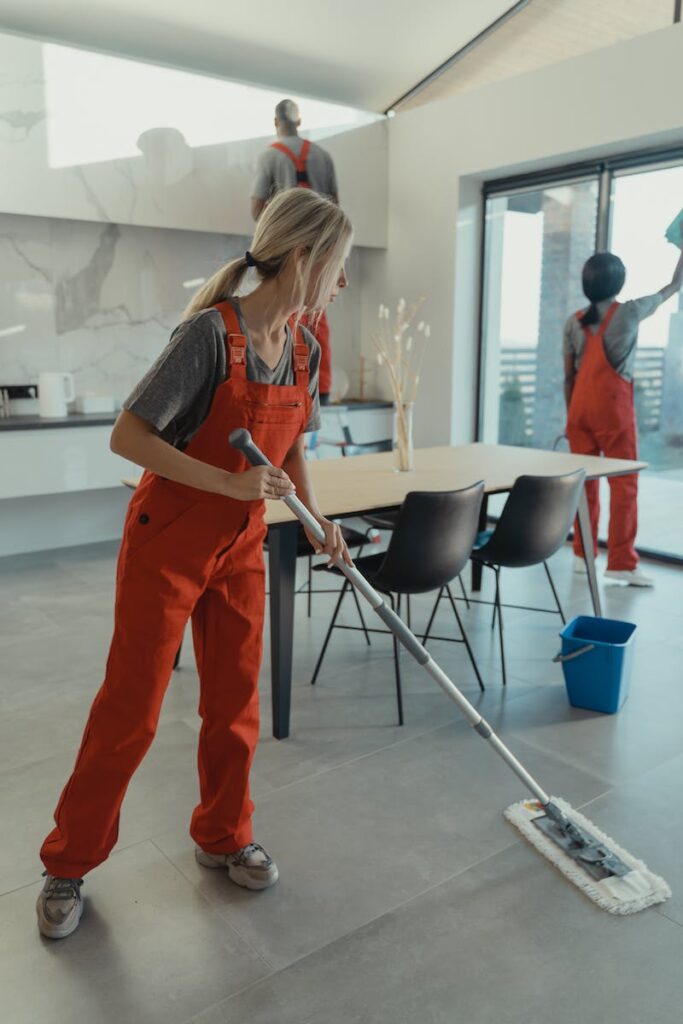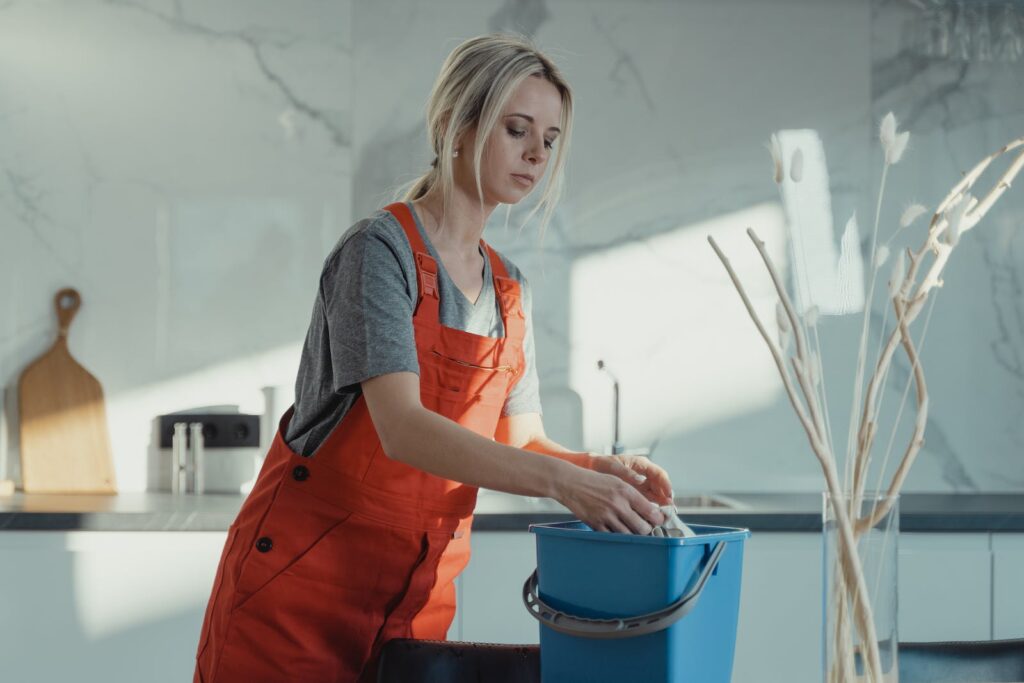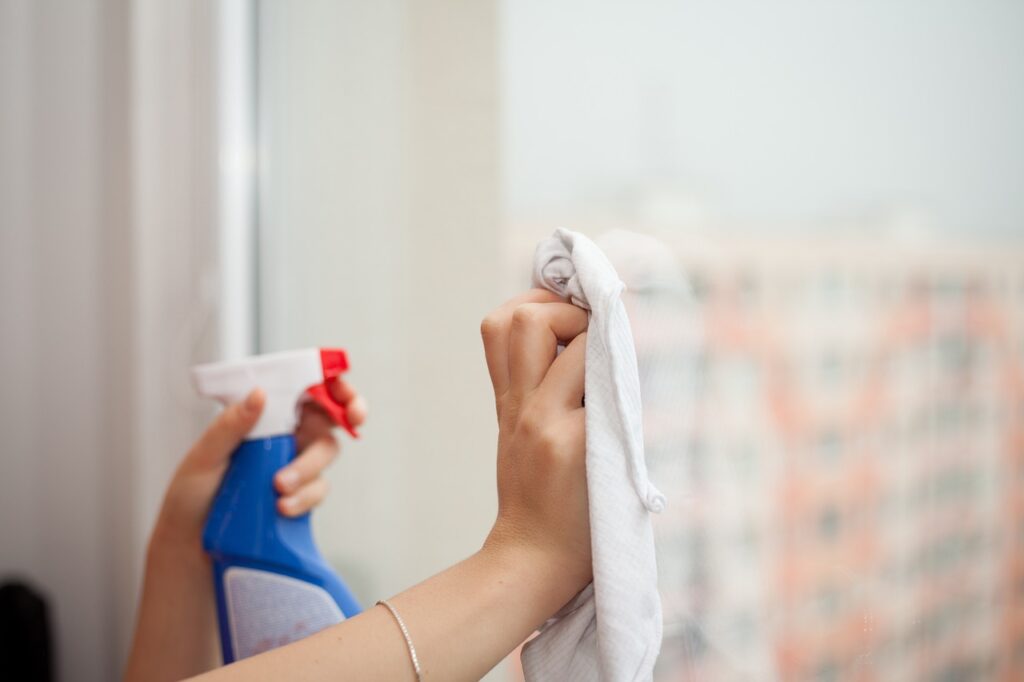Home cleaning is of paramount importance for several compelling reasons. First and foremost, it contributes to the health and hygiene of your living space. Routine cleaning eradicates dust, allergens, and harmful pathogens, reducing the risk of allergies and illnesses. It fosters a clean and organized environment that has a profound positive impact on mental well-being, promoting relaxation and reducing stress. Moreover, it plays a vital role in pest prevention by denying these unwanted intruders access to food and shelter. Common cleaning mistakes to avoid also promotes a safer home environment, minimizing the risk of accidents and the spread of illnesses caused by improper cleaning practices.
Safety is also a significant concern; a clean home minimizes the risk of accidents, such as tripping or slipping. Cleaning extends the lifespan of appliances, surfaces, and furnishings, while also enhancing indoor air quality, making it essential for those with allergies or respiratory issues. In summary, home cleaning is not merely about aesthetics; it’s about creating a healthy, safe, and inviting haven that positively affects your physical and mental well-being.

Common Cleaning Mistakes to Avoid:
Certainly! Here are some common cleaning mistakes to avoid in your home:
- Using Too Much Cleaner: Using excessive amounts of cleaning products can leave behind residue and may actually make the cleaning process more difficult. Follow the recommended product instructions for proper dilution and use.
- Not Reading Product Labels: Failing to read and understand the labels on cleaning products can lead to using the wrong product on a surface, which can damage it or be ineffective. Always follow the manufacturer’s recommendations.
- Not Ventilating the Space: When using strong cleaning chemicals, it’s important to have proper ventilation. Failing to do so can result in inhaling harmful fumes. Open windows or use exhaust fans when cleaning with harsh chemicals.
- Ignoring High-Touch Surfaces: Some frequently touched surfaces, like doorknobs, light switches, and remote controls, can be hotspots for germs. Neglecting these areas during your cleaning routine can lead to the spread of illness.
- Mixing Incompatible Cleaners: Mixing different cleaning products, especially ones that contain ammonia and bleach, can create toxic fumes. Always be cautious and never mix cleaning chemicals unless the label explicitly states it’s safe to do so.
- Not Cleaning Cleaning Tools: Cleaning tools like mops, brushes, and vacuum cleaner filters can accumulate dirt and bacteria over time. Failing to clean or replace these tools regularly can make your cleaning efforts less effective.
- Scrubbing Stains Too Aggressively: While it’s essential to tackle stains promptly, aggressive scrubbing can damage surfaces, particularly delicate ones. Use gentle methods first and gradually increase the intensity to avoid unnecessary damage.
- Leaving Clutter Unaddressed: Clutter can make cleaning more challenging and less effective. Before you start cleaning, declutter the area by putting items in their proper places or organizing them.
- Not Using Microfiber Cloths: Paper towels and regular cloths can leave streaks and lint on surfaces. Microfiber cloths are more effective at trapping dust and leaving surfaces streak-free.
- Skipping Routine Maintenance: Regular maintenance, such as changing air filters and cleaning out lint from dryer vents, is essential for the overall cleanliness and safety of your home. Don’t neglect these routine tasks.
By avoiding these common cleaning mistakes, you’ll be better equipped to maintain a cleaner and healthier living environment in your home.
How To Maintain a Cleaner Environment?
Maintaining a cleaner and healthier living environment in your home involves adopting good habits and implementing regular cleaning routines. Here are some tips to help you achieve this:
Create a Cleaning Schedule:
- Develop a cleaning schedule that outlines daily, weekly, and monthly tasks. Stick to this schedule to prevent dirt and clutter from accumulating.
Declutter Regularly:
- Get rid of items you no longer need or use. Clutter can collect dust and make cleaning more challenging.
Ventilate Your Home:
- Ensure proper ventilation by opening windows regularly to let fresh air in and remove indoor pollutants.
Dust and Vacuum Frequently:
- Dust surfaces, including shelves, electronics, and blinds, at least once a week. Vacuum carpets and floors regularly to remove dirt and allergens.
Use Doormats and Remove Shoes:
- Place doormats at entryways to trap dirt and prevent it from being tracked into the house. Encourage family and guests to remove their shoes at the door.
Keep High-Touch Surfaces Clean:
- Wipe down frequently touched surfaces such as doorknobs, light switches, and remote controls daily, especially during flu and cold seasons.
Clean as You Cook:
- When preparing meals, clean as you go to prevent a pileup of dishes and mess in the kitchen.
Use Proper Cleaning Products:
- Choose appropriate cleaning products for each surface and follow manufacturer instructions. Consider using eco-friendly, non-toxic cleaners.
Regularly Replace Filters:
- Change HVAC filters, water filters, and vacuum cleaner filters as recommended to improve air quality and appliance efficiency.
- Maintain a Clean Refrigerator:
- Regularly check and clean your refrigerator to prevent food spoilage and unpleasant odors.
- Clean and Organize Your Bathroom:
- Keep the bathroom clean to prevent mold and mildew growth. Organize toiletries and personal care products to minimize clutter.
- Wash Bedding and Linens:
- Wash bed linens, pillowcases, and towels regularly to prevent dust mites and bacteria buildup.
- Regular Pest Control:
- Implement pest control measures to prevent infestations, especially in areas prone to pests.
- Properly Store Food:
- Store food in airtight containers to prevent pests and food spoilage. Regularly clean the pantry and fridge to discard expired items.
- Maintain Your Garden and Yard:
- Regularly clean up the yard and garden to prevent pests and maintain the overall cleanliness of your property.
- Organize Your Storage Spaces:
- Keep storage areas like closets and the garage organized to make it easier to find items and prevent clutter.
- Pet Care:
- Clean and groom your pets regularly. Vacuum up pet hair and clean pet-related messes promptly.
- Educate Family Members:
- Teach your family members the importance of cleanliness and involve them in household cleaning routines.
- Professional Cleaning:
- Consider periodic professional deep cleaning for carpets, upholstery, and air ducts.
- Regular Maintenance:
- Stay on top of home maintenance tasks, like checking for leaks, fixing broken items, and addressing issues promptly.
By incorporating these practices into your daily life, you can maintain a cleaner and healthier living environment in your home, promoting a more comfortable and hygienic space for you and your family.

Benefits of Avoiding Mistakes While Home Cleaning:
Avoiding mistakes during home cleaning offers a multitude of significant benefits. Firstly, it ensures a more efficient and effective cleaning process, saving you time and effort. When cleaning tasks are executed correctly, they yield better results, leaving your home spotless and healthier. Secondly, the proper use of cleaning products and tools preserves the integrity of your surfaces and belongings, preventing unnecessary wear and tear. This can lead to cost savings in the long run as it reduces the need for repairs or replacements.
Furthermore, it contributes to a cleaner indoor atmosphere, reducing allergens and improving air quality, which is particularly beneficial for those with allergies or respiratory conditions. Ultimately, the benefits of avoiding cleaning mistakes encompass efficiency, cost savings, safety, and the overall well-being of your living space and its occupants.
